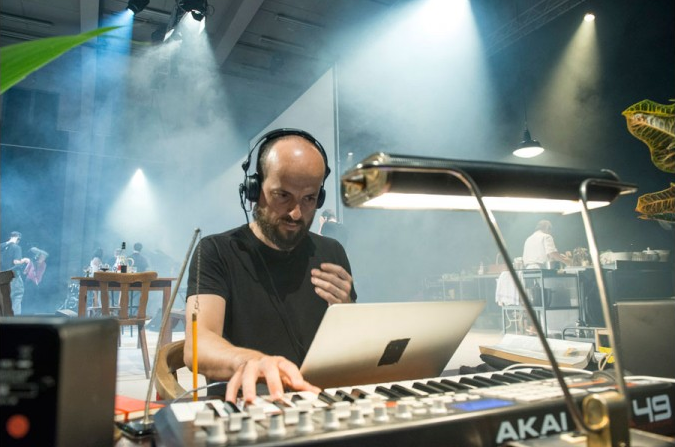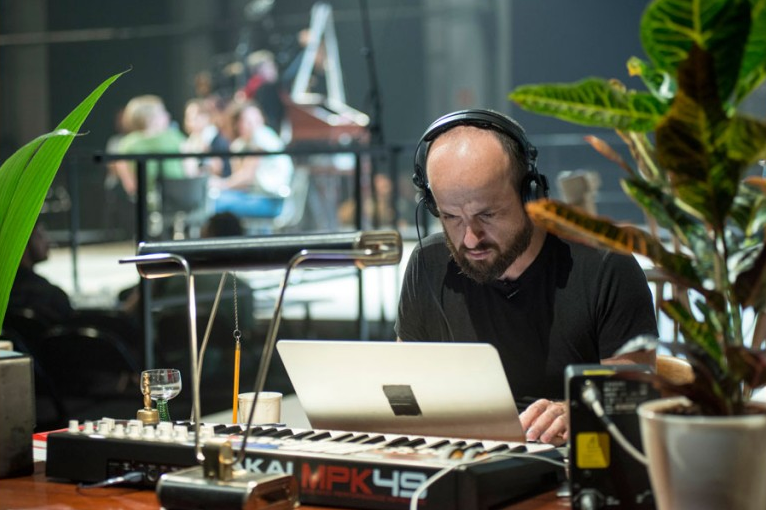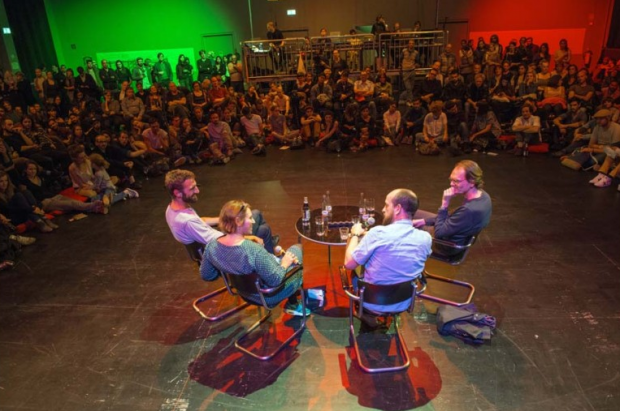
Photo by Marcus Lieberenz
From Thursday to Thursday of the previous week, everybody’s favourite found-sound-geek MATTHEW HERBERT took over the Tischlerei in the Deutsche Oper in Berlin with a team of nearly twenty others – including personal chef, four band members, lighting technician, discussion moderators, press and documentary team and a parent or two) with the intention of writing, recording and releasing an album. The caveat, as though further challenge was required, was that the album should embody all the political challenge and contextual wonder that, outside the world of purest sound-art, MATTHEW HERBERT makes his own. No small mission, but Herbert is no small man.
The week itself was divided into 7 day long topics, each of which was devoted to a song or piece on the final album. Each day began with a talk from Berlin art-aficionados who’s area of expertise centred on the day’s theme, from Detlef Diederichsen from HdKW riffing on the intersection of music as a mechanism of political change, to Bar 25’s and Holzmarkt’s founder Steffi-Lotta Knoth on the purpose of pleasure, to Ableton and Native Instruments project managers debating the gentrifying effect of their sonic tools and local Imams on sound’s quest for spiritual silence. This was obviously going to be a brief curtsey to the questions to which Herbert has devoted his entire practice and complete output, however it was an obvious privilege to invite the public to contribute sounds, thoughts, sound-thoughts and ready disagreement to anything he suggested. This was meant to be our record, and the release party on the final night as much ours as his.

Photo by Marcus Lieberenz
The start of the performance was welcomed by all composition nerds present (there were about 20 people who showed each day, though the room had seating for nearly 120) – the plotting of a manifesto for the work birthed a heavy sigh of relief throughout the room, one which was likely recorded, sampled and then used. Detlef and Tadzio Müller, a political activist and theorist from the Occupy Berlin group, focussed the composition via previous political actions, demanding precession, speed and an awareness of the size of proverbial mountain of ambition; if we’re going to enact a change with a piece of music, we would at minimum need these. This and several other points of intent, were consolidated into a five line manifesto which was to be consulted at crucial decisions. Naturally, when an audience is encouraged by initial contributory freedoms, especially at the alter of the prophet Herbert, one’s ego can get frisky and comfortably assume liberties within a project that was naturally much bigger than each individual contributor. This flawed first temptation, boasting liberties of previous models of creation, and igniting conversations of open-source software, Creative Commons licensing for the release, free releases, and the possibilities of universal access to files or alternatively equal access between all contributors implied something grand; a crowd-sourced MATTHEW HERBERT album that would surpass the tired PR campaigns of Beck’s sheet music or Death Grips bit-torrent experimentations, taking a full grasp of Matt Dryhurst’s desires to see the 40-year old album release schedule destroyed creatively in a post internet age.
Unfortunately however, the nature of the work’s release had been pre-determined, and in a sense was fairly traditional. It was a hand-made CD with all the markings of achievement and thanks one would expect from a project in which 100 people took serious time out of their lives to create – but it unfortunately made one feel as though the initial political agitation which was so utterly stimulating, had just been discussion after all.
The recording itself was a stunning insight into the composer’s process, his band wandering freely and eager to chat to anyone who had turned up for more than a day, and Mathew himself pulling people from the audience to help research statistics and hide the strippers the Deutsche Oper had funded to listen/sample to their skin. According to Matthew, in a world saturated with tools, decadence and musical output, a rationing or restriction would increase creative output and therefore, while the recording itself was based on exuberance and a sense of the infinite, the process itself was based 100% on simple choices executed well. Sure Tina (a young girl from Day 1’s audience) was whimsically whisked off to Romania for 4 days to collect sounds, however on her return she was only allowed to show six of them, and they were used as structural support for the rest of the piece. Herbert’s embodied mantra, confirmed by invites onto the stage to investigate the band’s gear (2 Ableton Samplers, a drum pad and a circuit bent violin into Max MSP); there is no such thing as voodoo in this world, only decadent temptation and simple, beautiful execution. Wether this is shown in the record however is harder to determine objectively since the sentimentality of spending a week in collaborative creation with one’s idols is distilled in each sample; it is however as enjoyable and frantic as any other Herbert record, densely packed with quick decisions which sound an urgency that one would not associate with an artist as heady, and prolific as him.

Record release party – Photo by Marcus Lieberenz
Assuming that the political motives of the week were as unavoidable as my tinnitus and the album had been created to support the education and re-prioritisation that the week of The Recording had provided, one might have logically assumed that Thursday’s launch party might have been a genuinely revolutionary affair. Unfortunately here the initial complaint with the method of release came hauntingly apparent, as 150 pre-sale tickets welcomed 150 Berliners into a room in which they had never sat, to a record that requested their contribution yet, majoritively, never received it. I don’t want to sound like ‘you weren’t there man, you don’t know Herbert like I do’. Maybe some had more invested in the project than others? Maybe those others just really wanted to hear him DJ? Maybe Berlin is just rude? However, when faced with a panel discussion of two political theorists, the bags under Herbert’s eyes and a topic of conversation which says: ‘we’ve worked really hard on this, maybe you could be quiet and listen?’, the audience went into ferocious conversation about which ROISIN MURPHY remix they liked best, and how they can’t wait for the upcoming Herbert turntablism. The Recording, played over the Deutsche Oper PA, having been mastered and pressed just 3 hours before, was inaudible to even those who had contributed.
I believe in this final act of choosing wine and chit-chat over the political act, the unintended lesson for all involved became most apparent. There are infinite ways to engage musical contributors – as HERBERT‘s week-long work clarified – however, this is not the challenge. If we’ve taken a week out of our lives to contribute, we’re already on your side. There are also infinite ways to engage an audience, and here lies the challenge when creating a musical political mechanism. If you fail to engage your audience, the roots of political change become nostalgic ash, as soon as the CD burns.
Finally. Thank you. A stunning week of insight and a privilege to watch an artist make mistakes, get confused, and be so utterly human in front of a room of ever-loyal fans, and now, co-contributors.
—



